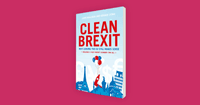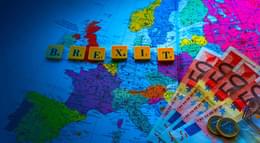
Clean Brexit: Why leaving the EU still makes sense
Comment Central's Brexit Editor, Bruce Newsome, reviews "Clean Brexit: Why Leaving the EU Still Makes Sense" authored by Liam Halligan and Gerard Lyons, published by Biteback, paperback, 382 pp. £10.99, ISBN 9781785904035
What a sad indictment of our current elite, that a book about how to leave the EU, first published in September 2017 – seemingly late, at 15 months after the referendum – has been released in a new edition already, amidst renewed "project fear" about how bad leaving would be.
This new edition benefits from a new foreword by Gisela Stuart, a new preface and a new conclusion by the two authors, and a new afterword by Jacob Rees-Mogg. Their similar pithiness and erudition make their lancing of "project fear" an enjoyable, revelatory ride.
In the foreword, Gisela Stuart (a former Labour MP and Chair of Vote Leave, which is now Change Britain) notes that the elite has established a false consensus that a soft Brexit would be most satisfactory and least damaging. "Government has been too inward-looking, and has not done enough to make the case and defend the reasons why a clear majority of British voted to leave the EU." She has the left-wing credibility to remind us that Brexiteers represent the political spectrum, yet the elite has created the myth that Brexit is right-wing extremism. In the afterword, Jacob Rees-Mogg writes that much of the vectoring towards soft Brexit "has taken place in code, with talk of remaining in the single market or customs union appearing to be a benign way of imprisoning us in the EU." The two authors got to write their new preface in July, after Theresa May released her latest policy: "At Chequers, the Prime Minister displayed a lack of vision and confidence in her country, outlining a proposal to tie the UK to the EU."
Liam Halligan you'll probably remember best as economics correspondent for Channel 4 News, before it turned in the 2000s to sensationalist socialist sophistry. I remember him on that programme complaining about the insufficiency of economic literacy in this country. How more important that seems now that the myths of "project fear" are dominant. Appropriately, the book criticizes "the group think and status quo bias of the economics profession" (page xv), "how quick much of the UK press corps was to accept briefings from the [President of the European Commission, Jean-Claude] Juncker camp as an accurate analysis" (page 104), and how, instead of analysing the opportunities after Brexit, "the media is fixated, instead, on how we will leave – and if we will leave" (page 305).
Halligan's co-author is Gerard Lyons, whom you might have seen commentating, but has stuck to a career in finance.
This is not a short book, it's not a superficial book, but it reads easily. The chapters on the EU's prior history are the best summaries I've seen. The analyses of the current issues are accessible, yet contain enough depth for the academic and the diplomat. I kept wondering, "Why can't our politicians and journalists communicate so clearly and accurately?" You probably know the answer to that: most are bluffers.
I will criticize the authors for not updating their data in the main body text. In the first chapter, you'll read economic forecasts for the final quarter of 2017 and first quarter of 2018. In the later chapters, you'll read their forecasts for the European Union (Withdrawal) Bill in autumn 2017. These forecasts could have been replaced easily with what actually happened. However, the other parts remain current, because the government has achieved naff-all since the first edition.
Halligan and Lyons advocate for a "clean Brexit," as opposed to a "messy Brexit" – an accurate term for what Remainers term a "soft Brexit," and what I have called a "fake Brexit." "A Messy Brexit seeks to trade off single market membership against freedom of movement rules. This gives Britain no control over the central aspects of leaving the EU. Taking this route maximizes 'cliff-edge' dangers and business uncertainty – and could result in a disastrous stalemate. So-called Soft Brexit, while rhetorically appealing to some, does not exist." (page 2) In the afterword, Jacob Rees-Mogg characterizes soft Brexit as "staying in the EU in all but name."
A clean Brexit means fully separating from the EU, just as Brexit was interpreted during the referendum. After separation we would be left with WTO (World Trade Organization) rules at bare minimum, which effectively guarantee equal trade except as agreed bilaterally or interrupted temporarily on grounds of security. Most of Britain's trade is under WTO rules, including with the US, China, India, and Brazil; the EU too trades with most countries under WTO rules. The EU is incentivized to comply, given its trade surplus to Britain.
Better than bare minimum would be a free trade agreement, but the authors consistently remind us that Britain cannot hope to negotiate a free trade agreement unless it stops pretending that WTO rules amount to a cliff edge. The authors note that the government sabotaged itself by not promoting the possibility of no deal as a "perfectly acceptable outcome" (page xiv).
The government still contradicts itself: earlier this month, it released belated, sparse, alarmist advisories about no-deal, then (given the backlash) used the latest Brexit Secretary (Dominic Raab) to play down its own fear-mongering, only for him to be contradicted by the Chancellor (Philip Hammond), who claimed that no-deal will slow economic growth by up to 10 per cent over the next 15 years. Then Hammond was contradicted by the Prime Minister, who restated that no deal is better than a bad deal, although her intervention is difficult to believe given her normal panic.
Britain needs to retake its independent seat in the WTO and negotiate free trade promiscuously – it can do so before final separation from the EU, so that its FTAs come into force the next day. "As the world's fifth-biggest economy, the UK has a much better chance of securing trade deals with other large economies acting alone – as Switzerland did with China, striking an FTA in 2013, after a two-year negotiation." (page 307)
Instead, the government has wasted its time pretending that it must wait for the EU's cooperation, or it can't find enough civil servants, or it still needs to develop a policy, or (at Chequers in July) that Britain needs to stay in the common market and customs union for goods, which then scuppers any independent FTA. Reading this book further clarifies how pathetic the British government has become.
This raises the counter-factual that the government should have renounced the EU in favour of WTO rules already, then negotiated a FTA from that position of full sovereignty and certainty. I am proud to say I was calling for immediate separation by December 2017, seeing the writing on the wall for a government led by Remainers intent on procrastination and dilution of Brexit. Halligan and Lyons were not then and still are not recommending immediate separation: they advocate for a transition period. In this, they agree with government policy, but they limit the transition to two years, and want it to transition to clean Brexit: "We support a transition arrangement as long as it is carefully designed and cannot be used to keep the UK in the EU beyond a pre-agreed period." (page 140)
This book is more than a blueprint for Brexit – it's a wider manifesto. It notes the huge economic problems driven by the shortage of housing. Apart from controlling immigration, the book recommends that the government should set up its own National Development Corporation, which would purchase land, grant planning permission, then sell the land at a profit for private development, then use the profits to fund infrastructure (page 10).
The author's champion also the Labour Party's policy to create a National Transformation Fund to invest £250 billion over 10 years in infrastructure. The authors state unambiguously: the "Labour manifesto was right" on this (page 12). Another recommendation in the same vein is to make broadband a utility. These policies prove the book's a-partisan pragmatic approach. The authors are not socialists – they just recognise (as all politicians should) that sometimes situations arise where more state intervention is needed (which neo-conservatives never accept), sometimes less (which socialists never accept).
At the other end of the political spectrum, the authors stand with conservatives for a reduction in regulations and taxes, particularly on small and medium enterprises, which struggle most to handle them. The book frequently points out the stranglehold that "big business" has on government, pretending that the EU is best for everybody, acting through civil servants who don't have enough competence to think independently.
The authors stand also for decentralization to local authorities of stamp duty from property transactions, which could go towards the local infrastructure supporting those properties. While we're focused on freeing ourselves from the centralization and under-accountability of the EU, we're under-estimating the centralization and under-accountability of the British government, but that focus will come. Halligan and Lyons partly address this future by urging the government to distribute to local governments some of the powers that will be returned from Brussels.
Theresa May and her cronies could restore their credibility more by justifying their policies in comparison with this book than in comparison with any missive from Brussels.
Book reviewed: "Clean Brexit: Why Leaving the EU Still Makes Sense" authored by Liam Halligan and Gerard Lyons, published by Biteback, paperback, 382 pp. £10.99, ISBN 9781785904035















